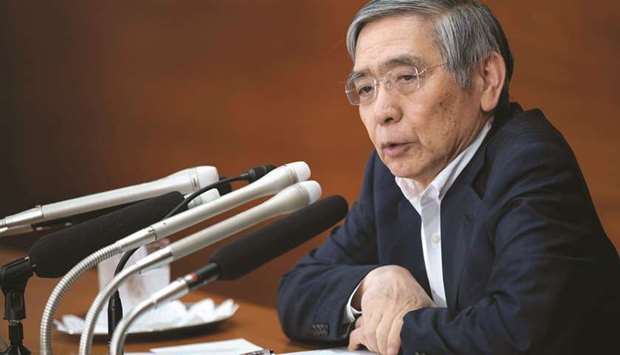After a two-day meeting, the BoJ said it would retain its current framework, pointing to a disappointing lack of progress towards its longstanding 2% inflation target.
It lowered its expectations for inflation this year to 0.5%-1%, from around 1% previously tipped.
Speaking after the meeting, Kuroda said a persistent “deflation mind” was plaguing Japanese boardrooms and families, keeping the target he had hoped to reach by 2015 a distant goal.
“I believe the momentum remains intact for us to achieve the two-percent price (inflation) target,” he said.
“I believe the current framework is sustainable,” he added of the bank’s decision to maintain its monetary easing measures.
Kuroda took the post in 2013 pledging that he would help put the economy on a sustainable growth path and eradicate Japan’s long-running problem of almost non-existent inflation.
After rounds of huge easing and stimulus programmes, he has had to delay the target date several times, with consumer prices rising only 0.7% in April, weaker than in past months.
The bank’s decision to keep its monetary policy in place and maintain its key policy rate around zero was widely expected.
But it sets it at odds with its US and European peers.
In the US, solid, ongoing economic growth has convinced the US Federal Reserve to gradually increase its policy rate.
And the European Central Bank is also making gradual steps toward normalising its easy monetary policy although it said its interest rates would stay at current record lows through at least the summer of 2019. “In the United States, wages and prices are steadily rising. The FOMC’s (Federal Open Market Committee) decision to move toward normalisation... matches the reality of its economy and wages,” Kuroda said.
“Europe is progressing at a relatively slower pace,” and its normalisation efforts also being delayed accordingly, he said.
But Japan has been slow to see prices rise, as firms and consumers remain cautious on spending. “A special factor affecting our country is that there remains ‘deflation mind’ in the corporate and household sectors after the 15-year period between 1998 through 2013 of deflation, low growth,” Kuroda said.
That cautious mindset has kept prices from rising, he warned.
“Deflation mind still remains. That’s a factor unseen in the US and Europe,” he said.

